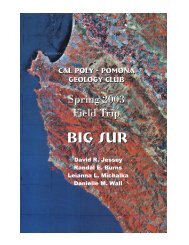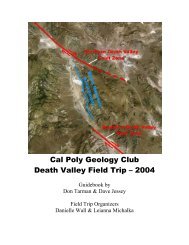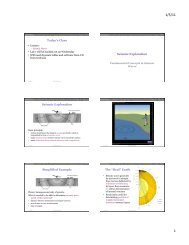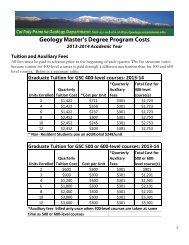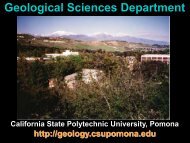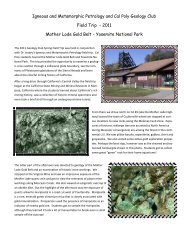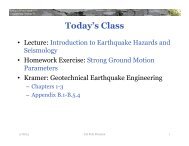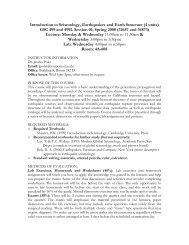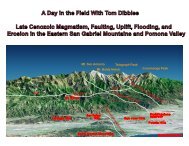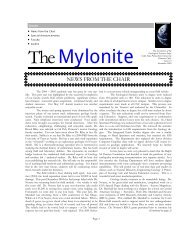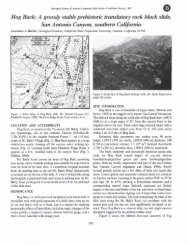Appendices to Qualitative Program Indicators - Geological Sciences ...
Appendices to Qualitative Program Indicators - Geological Sciences ...
Appendices to Qualitative Program Indicators - Geological Sciences ...
You also want an ePaper? Increase the reach of your titles
YUMPU automatically turns print PDFs into web optimized ePapers that Google loves.
Jobs abound in the petroleum mining and environmental industries.<br />
http://sciencecareers.sciencemag.org/career_development/previous_issues/article...<br />
Page 2 of 3<br />
8/8/2008<br />
finding jobs, particularly in environmental consulting--<br />
although a master's is generally needed <strong>to</strong> move up<br />
the ladder from fieldwork <strong>to</strong> the office.<br />
That intense competition for new hires has raised<br />
starting salaries in these industries, especially oil:<br />
Graduates now entering the petroleum industry earn<br />
$82,500 a year, on average, according <strong>to</strong> AGI.<br />
Salary Tools<br />
Find out how much you're<br />
worth with our salary<br />
calcula<strong>to</strong>r<br />
To Advertise<br />
Find Products<br />
Geoscience salaries generally have also been<br />
increasing, AGI data show. In 2005, the average<br />
starting salary for a geoscientist in an industry,<br />
academic, or government position was $74,000, a<br />
9.7% increase over 2004. For later career scientists<br />
with more than 20 years of experience, the average<br />
salary was $139,000 in 2005, an increase of more<br />
than 23% over the previous year.<br />
Click on image for full-size<br />
view.<br />
The current hiring boom in the petroleum industry is a welcome change from the layoffs of the<br />
1980s and 1990s; unemployment among geoscientists reached 11% in 1985. Those layoffs left<br />
a distinct gap in the oil industry workforce between new hires and senior managers, a 2007<br />
National Petroleum Council report noted. And with many senior managers likely <strong>to</strong> retire within<br />
the next decade, there aren't enough midlevel managers ready <strong>to</strong> take the helm. This hiring<br />
and firing pattern is "<strong>to</strong>tally cyclical," Martinez says. "The industry needs <strong>to</strong> work on fixing that."<br />
Although industry jobs are readily available, the job market is <strong>to</strong>ugher for students seeking<br />
careers in academia. One problem is a research-funding shortage, as primary funding sources<br />
such as the National Science Foundation have suffered from essentially flat research budgets<br />
for the past few years. That lack of research money contributes <strong>to</strong> another trend: When a<br />
venerated geology professor retires, some universities are choosing not <strong>to</strong> hire a replacement,<br />
filling the position with a scientist in a different, often environmental, field, or not at all. As of<br />
January 2008, the number of geoscience faculty members in U.S. colleges and universities<br />
was 12,354, down from 13,554 in 1999, according <strong>to</strong> a June 2008 report released by AGI.<br />
LEARN MORE ABOUT<br />
CAREERS IN THE<br />
GEOSCIENCES ...<br />
• Geoscientists in High<br />
Demand in the Oil<br />
Industry, Lucas Laursen<br />
• Hydrogeologists Tap in<strong>to</strong><br />
Demand for an<br />
Irreplaceable Resource,<br />
Robert Coontz<br />
• Science Careers Podcast:<br />
Geoscience Careers,<br />
Kate Travis<br />
The lack of available academic positions has left<br />
geoscientists who aspire <strong>to</strong> faculty jobs in limbo, often<br />
stringing <strong>to</strong>gether several postdoc positions as they<br />
wait for openings, Martinez says. The percentage of<br />
geoscience postdocs "has really gone through the<br />
roof," with about 58% of Ph.D. graduates pursuing<br />
postdocs in 2005 compared with 40% in 1999. That<br />
trend may soon slow if a combination of strong<br />
industry salaries and weak academic opportunities<br />
pushes some students <strong>to</strong> leave graduate school early.<br />
"We're seeing geoscientists in droves going in<strong>to</strong><br />
industry with master's degrees and not staying on for<br />
Ph.D.s," Martinez says.<br />
"My perception is indeed that there are many more<br />
applicants for jobs than there are positions," says<br />
Joseph Colgan, a Mendenhall Postdoc<strong>to</strong>ral Research<br />
Fellow at the U.S. <strong>Geological</strong> Survey (USGS) in<br />
Menlo Park, California. Colgan, who studies the geologic setting of mineral deposits in the<br />
western United States, has considered academic jobs but would like <strong>to</strong> stay in a more<br />
permanent job at USGS. However, the agency, like many universities, has tightened its belt<br />
after years of flat or declining budgets, which means fewer hires.<br />
Geoscience graduates will have training that qualifies them for jobs outside of their home field.<br />
Scientists with training in multidisciplinary specialties such as iso<strong>to</strong>pic tracers, mineral<br />
commodities, and geotechnology are successfully venturing in<strong>to</strong> fields that aren't considered<br />
geologic, including medicine, law, and finance. In fact, only 50% of people with geoscience<br />
degrees currently work in the geosciences, according <strong>to</strong> AGI.<br />
Ultimately, for geoscientists who want <strong>to</strong> work in industry, job opportunities abound. "The earth



